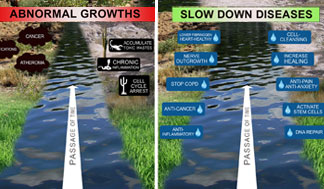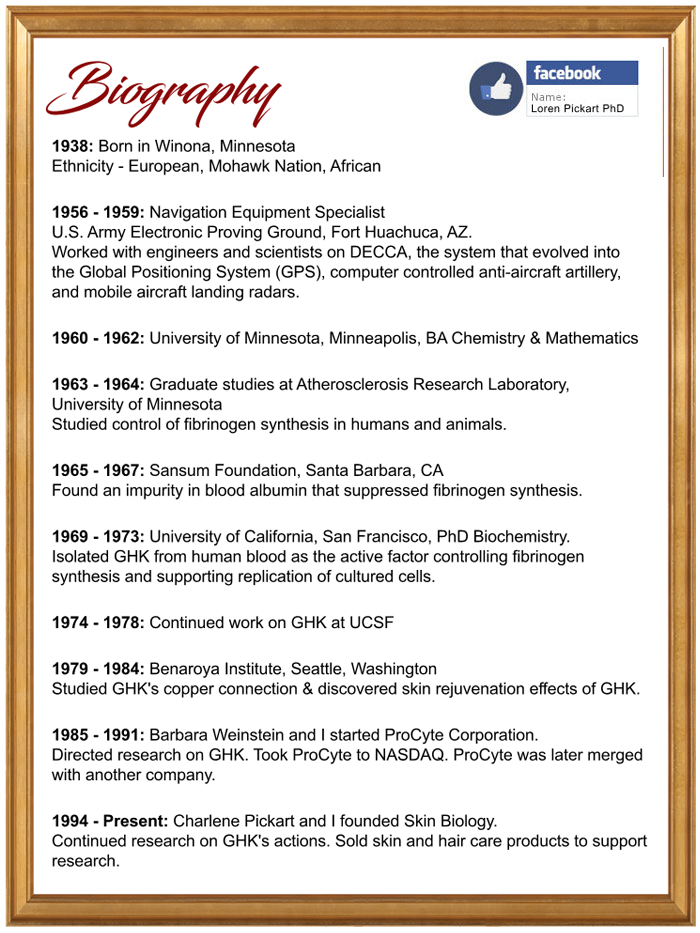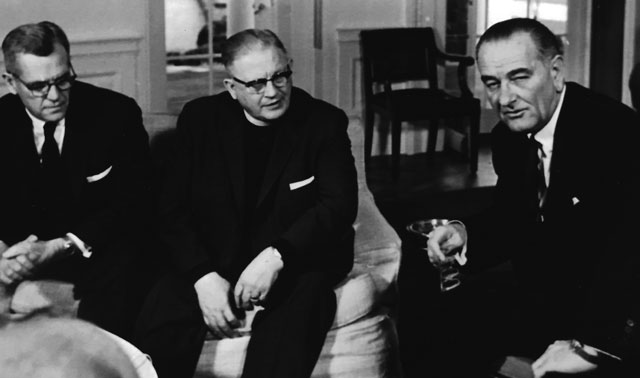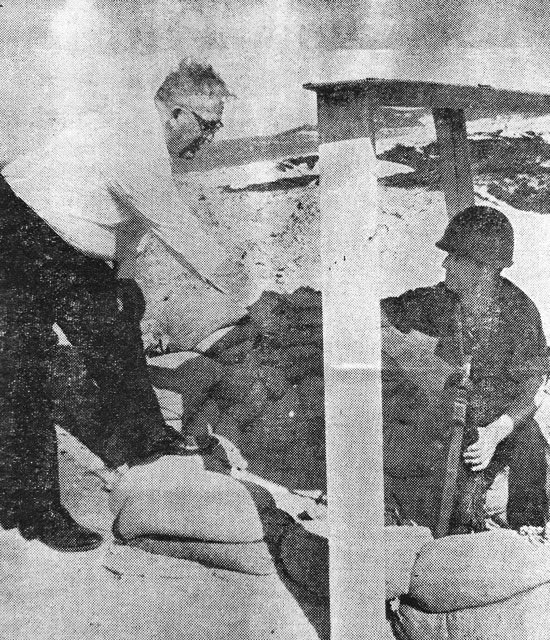by Loren Pickart, Discoverer of GHK and many of its biological effects
BA Chemistry and Mathematics, University of Minnesota
PhD Biochemistry, University of California, San Francisco
- - - VIEW THE ORIGINAL THESIS ON GHK: "A TriPeptide From Human Serum" (June 1973)
The Story of My Life May Affect You & Your Loved Ones
When I was young, there were 21 Protestant ministers in the family, mostly in the Evangelical United Brethren Church (EUB) in small farm towns in Minnesota. The most distinguished, in a worldly sense, was Reuben Mueller, who moved the EUB into the Methodist Church to form the United Methodist Church. Reuben was also the President of the National Council of Churches during the worst days of the Vietnam War and gave many talks on ending the war. Two Pickart men, of a total of 400 living in the USA at that time, died fighting there. One was a Warrant Officer helicopter pilot and the other was a Corporal in the 101st Airborne Division. Both were 20 years old when they died. Reuben also talked and wrote about improving race relations in the USA (he emphasized that everyone needed the following: a nice home, a good neighborhood, a good job).
Another family member who inspired my personal journey was Russell R. Boehlke. Boehlke worked for many years as an ophthalmologist, dedicated to helping others including those in developing lands.
The overall message from the family was that each person should have a mission in life.
My maternal grandmother died in great pain and misery of aggressive metastatic colon cancer in 1940. My mother often talked about her mother and lived in fear of such a death. So, at age five, I told my mother, "Don't worry Mom, I will become a scientist and cure cancer".
I finished high school at 16 and went to college, but had money only for 1 year. Then at 18, I was drafted into the military. I could have avoided the military by getting a deferment to work on the family farm, but I would have joined the assault infantry to get off the farm. So I enlisted to be trained in an occupation where I could later earn a living.
Both electronics and physics were very easy for me; you learn a little and can usually guess the answers to more complicated problems. The US Army trained me in navigation electronics and I spent most of my time working with civilian engineers and scientists at Fort Huachuca, Arizona. I worked on the Decca system which evolved into the Global Positioning System.
But my greatest success was with an early computer system designed to lock-on aircraft with radar and direct anti-aircraft artillery. The US Army had bought five of these very expensive units and put the units at different bases that evaluated their actual functioning to meet design specification. The inspection team had visited four of the units on the other bases and all failed to meet specifications. But the unit that I was in charge of exceeded design specifications. We could lock-on aircraft sixty miles away and follow them even as they briefly went behind mountains and the radar would lock-on again. The military people and the civilian engineers were ecstatic. This made me Top Soldier for a month. See below.
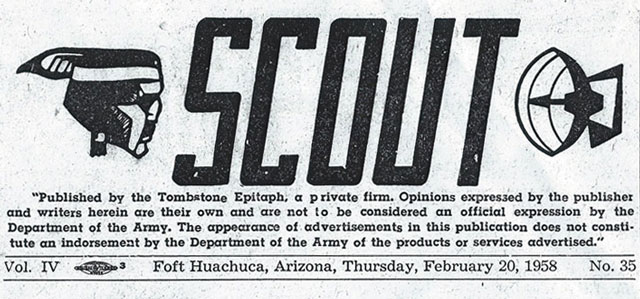
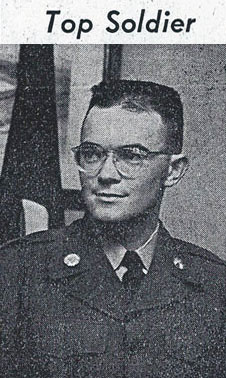 |
JANUARY'S BEST — Sp3 Loren Pickart, who is assigned to Detachment 2 and works at Libby Army Air Field, was chosen as the Soldier-of-the-Month for January. |
|---|
Litton Industries, a large defense contractor, offered me support after the Army if I came to Los Angeles worked for them while getting a degree at UCLA in electronics.
Physics was also easy. Learn a little and guess the rest. Later as an undergraduate at the University of Minnesota I took two quarters of Theoretical Physics and the department offered me financial support if I would switch my major to Physics.
But I stuck with my promise and obtained degrees in Chemistry and Biochemistry, both of which are not especially logical, and spent my life working on human aging and its diseases and found GHK. Yet, my mother suffered and died in the same pain and misery of aggressive metastatic colon cancer in 1997.
In 2012, researchers at the Singapore General Hospital, using patient gene data and Broad Institute data, found that the Broad computers recommended GHK, out of 1,309 molecules, as the best potential treatment for aggressive metastatic colon cancer. What are the statistics on this happening? Grandmother, mother, and finding GHK: together?
Penicillin and insulin were two molecules that fascinated me. For two weeks when I was 10 years old, I was bedridden with a serious and painful streptococcus throat infection. A physician drove out to our farm and gave me as shot of penicillin and in two hours all the pain vanished. Also, older adults talked of the slow and painful deaths of young people with juvenile diabetes before insulin was used. But after four months working a research laboratory, I realized how difficult it would be to discover a new molecule that would help in treating of difficult human diseases. So I did what our family's ministers always recommended and prayed to God to lead me to a new miraculous health molecule. This was GHK which I isolated in 1973 but whose importance only began to be understood after 2010.
However, I did not start my research on cancer. In 1960, I talked with health research scientists at the University of Minnesota Medical Center. They all told me that cancer and heart disease would be cured in 10 years and they doubted that their health science graduates would be able to even obtain employment. But I reasoned that people would still age and this would generate new diseases. So, I found a laboratory in Minneapolis that worked on heart disease and aging. It was a rather dysfunctional laboratory but this very fault gave me a lot of freedom to do strange experiments.
All in all, over the past 54 years my work has gone better than I expected. But things have been difficult because of all the attacks me and my work by many one-dimensional academics and the US Government which has had the effect of slowing and even stopping my research projects for human healing on GHK and copper peptides.
In cosmetic products, GHK has been found to tighten loose skin and improve elasticity, skin density, and firmness, reduce fine lines and wrinkles, reduce photodamage, and hyperpigmentation, and increase keratinocyte proliferation. GHK has been proposed by university researchers as a potential therapeutic agent for skin in inflammation, chronic obstructive pulmonary disease, and metastatic colon cancer. It is capable of up- and down-regulating at least 4,000 human genes, essentially resetting DNA to a healthier state.
The copper peptide skin care products have proven effective in many independent studies and are now widely used in skin care. The use of copper peptides for skin renewal has spread widely throughout the skin care industry. Look up "copper skin care" on Google Search if you doubt this.
You might wonder why GHK has been so little studied with all the positive actions reported from various universities. The reason is that the GHK work has been under attack for decades by most academics in this field.
My work on GHK has been called fraudulent, of no possible medical value, and unlawful research. Yet papers from various universities on the positive health actions of GHK keep being published.
Now at at age 80, my goal is to get these ideas out to the world and GHK's possible uses to reduce human diseases before the Forces of Inertia and Evil can bury the GHK work.
Inspirational Family Members
REUBEN H. MUELLER
President Johnson meets National Council of Churches Leaders to discuss Civil Rights. Irwin Miller and Bishop Reuben H. Mueller (Center). The churchmen were demanding passage of the1964 Civil Rights Bill. Bishop Mueller is Loren Pickart’s uncle.
Good Friday 1966 saw NCC President Reuben H. Mueller visiting U.S. servicemen on duty in forward positions at Cam Ranh Bay in South Viet Nam. The temperature was 90 degrees, prompting Bishop Mueller to shed his jacket. The traditional Eastertime preaching mission of Bishop Mueller to US troops overseas took him in 1964 to Spain and Germany, in 1965 to Japan and Korea, and in 1966 to Thailand and South Viet Nam.
. . . . . . . . . . . . . . . . . . . . . . . . . . . . . . . . . . . . . . . . . . . . . . . . . . . . . . . . . . . . . . . . . . . . . . . . . . . . . . . . . . . . . . . .
RUSSELL R. BOEHLKE
1927 - 2016
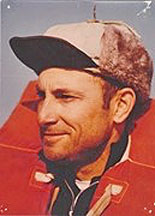
Loren's cousin Russell Boehlke was born in the family farmhouse to Emma and Fred Boehlke in Stewart, Minnesota. He grew up a farmer, graduated from the local country school, and always prided himself on working the farm.
Dr. Boehlke graduated with his MD from the University of Minnesota in 1955. After serving in the Public Health Service as an Indian Health Services doctor, he had a residency in the then-fledgling field of ophthalmology.
After 1960, he founded the Eye Center of Northern Colorado and served patients for over 40 years. He, his wife Donna, and various family members made nine annual mission trips to Africa, restoring sight to countless patients at the Kissy Eye Clinic in Sierra Leone. After the civil war in Sierra Leone stopped his work there, he worked on visits aboard the Hope Ship and in clinics in Haiti, Belize, and Brazil.
"One of my favorite memories of Doc was on a month-long trip to Sierra Leone, W. Africa. It was intensely hot, but we had a decent apartment over the surgery, with good screens to keep out bugs. A chameleon had the inside of the screens, staying well fed on the mosquitoes.
We slept in different rooms, under mosquito nets, which draped the bed and laid on the floor about 18 inches. One night I woke up with the "willies", and went to take a (cold) shower to calm down. About midday the next day, I saw a spider INSIDE my net, crawling on the wall, and the size of my palm! I finally killed it with my shoe, and when I told Doc, he smiled and showed me his ankle, swollen where he had been bitten by one 3 weeks before.
Doc did wonderful surgery. Cataract implants were somewhat routine, but once I looked into a blind man's eyes, and his natural lens looked like walnut burl, totally preventing vision. After surgery, people would think that the hand of GOD had reached down and restored their sight. That time every year, devoting himself to helping others, was the most "Christ-like" that I have ever seen anyone."
Steve Guild
Fort Collins, CO
DAUGHTER: FRANCOISE D. PICKART
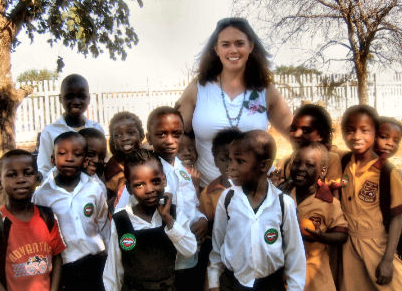
Francoise wanted to work with actual people in an area of health care. After High School, she majored in Chemistry at the University of Washington. Then she served 27 months in the US Peace Corps working with churches to improve the status of women in Malamulele, South Africa. After this, she earned a MPH degree from Columbia University. Currently she works in the New York City Department of Health and Mental Hygiene.
The picture is Francoise and her many happy friends.














